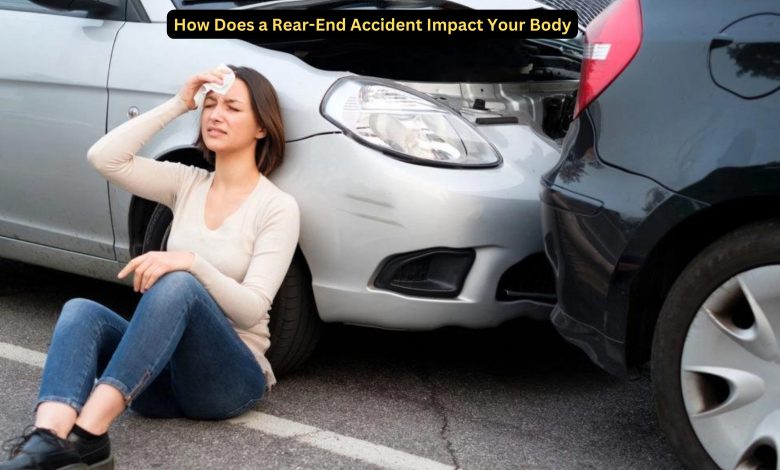
Have you or someone you love been involved in a rear-end accident? Such accidents can seem minor at first glance, but the impact on your body can be more severe than expected.
Many people in Connecticut experience unexpected injuries and uncertainties following these incidents. Here, you can learn more about how your body might respond to a rear-end collision and how Connecticut auto accident lawyers can assist you during this challenging time.
Understanding the potential health effects is the first step toward seeking the appropriate care and legal support needed to recover fully.
Whiplash and Neck Injuries
One common injury from a rear-end car accident is whiplash. This occurs when the sudden impact causes your head to jerk backward and forward, much like the crack of a whip.
Symptoms can include:
- Neck pain
- Neck stiffness
- Headaches that start at the base of the skull
- Dizziness
- Blurred vision
- Fatigue
See a doctor if you’re experiencing any of these symptoms after an accident. Treatments for whiplash might involve pain management, physical therapy, and, in some cases, wearing a cervical collar for support. Early intervention is critical to preventing long-term issues.
Back Pain and Spinal Injuries
Rear-end accidents can also lead to back pain, signaling more serious spinal injuries such as herniated discs or fractures. A herniated disc happens when the force of the crash causes one or more of the discs between your vertebrae to move out of place, resulting in nerve pain and weakness.
Spinal fractures can vary in severity, but they all demand immediate medical attention to manage pain and prevent further injury. The long-term effects of these injuries can include chronic pain and reduced mobility, which affect your ability to perform everyday activities. Treatment options depend on the injury’s severity but may involve medication, physical therapy, or surgery.
Head and Brain Trauma
Rear-end collisions often cause the head to move rapidly, increasing the risk of head and brain trauma. This can include concussions or more serious traumatic brain injuries (TBIs), which happen when the brain gets jolted inside the skull.
Signs of a concussion might be confusion, headaches, memory issues, or mood changes. If you hit your head or even if you just feel “off” after an accident, it’s important to see a doctor. Medical professionals can assess your symptoms and might use scans to examine your brain.
Soft Tissue Injuries
The force of a rear-end collision affects more than just your bones; it can also hurt the soft tissues in your body, such as muscles, ligaments, and tendons. You might end up with sprains, strains, or tears.
These injuries can cause a lot of pain and make it hard to move the affected part of your body. For instance, you might have trouble turning your head or lifting objects. Treatment often includes rest, ice, compression, elevation (RICE), and physical therapy to help you recover.
Psychological Impact
Being in a rear-end collision can leave more than just physical scars; it can also affect your mental health. Some people may find themselves experiencing symptoms of post-traumatic stress disorder (PTSD), including flashbacks, nightmares, and severe anxiety related to the accident.
Others might feel a general increase in stress or anxiety when driving or even as passengers. Getting support for these feelings is crucial. Mental health professionals can provide therapies that help manage these symptoms. Support from friends and family also plays an important role in recovery.
Delayed Onset of Symptoms
After a rear-end collision, some symptoms might not show up right away. It’s common for pain, discomfort, or other signs of injury to appear days or weeks after the accident. This delay can be due to the body’s initial shock response and the adrenaline that floods your system, temporarily masking pain.
Therefore, seeking a medical evaluation after an accident is important, even if you initially feel fine. Early diagnosis and treatment can prevent complications and properly address any issues.
Legal Implications
In the aftermath of a rear-end collision, navigating the legal landscape becomes critical for those involved. Determining who is at fault is central to insurance claims and potential litigation, with the rear driver often deemed responsible for not maintaining a proper distance.
However, circumstances vary, and fault isn’t always clear-cut. Connecticut auto accident lawyers can be beneficial in this situation, helping to protect your rights and ensure fair compensation. Your attorney can guide you through the complexities of claims, negotiate with insurance companies, and represent your interests in court if necessary.
Rehabilitation and Recovery
The path to recovery after a rear-end accident involves rehabilitation to treat your injuries and any issues they cause. Physical therapy is a core component of restoring strength, mobility, and function. Chiropractic care can also play a vital role, especially for those suffering from spinal alignments or neck injuries.
In some cases, alternative treatments like acupuncture may be recommended to aid in pain management and healing. Patients need to work closely with their healthcare providers to develop a personalized recovery plan that addresses all aspects of their rehabilitation.
Protecting Your Rights and Well-Being After a Rear-End Accident
The impact of rear-end collisions extends beyond the initial moment of impact, encompassing a range of physical, psychological, legal, and recovery aspects that victims must navigate. Understanding the potential for immediate and delayed symptoms is crucial for a comprehensive health evaluation and treatment plan.
Legal complexities are likely in these cases, so it is recommended that you work with a Connecticut auto accident lawyer. They can help you get the right treatment and ensure you receive the full compensation you deserve.